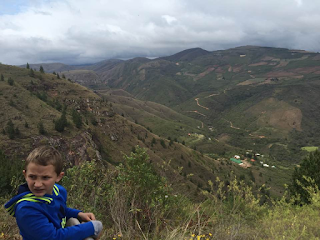Samaipata’s Inca Ruins
From the little archaeological museum in Samaipata, you
discover that this town was founded by the Chané Tribe nearly 2,000 years ago.
The Chané were a peaceful people that grew corn
and peanuts. They made beautifully
designed pottery with intricate designs.
They built a temple on the highest point of Samaipata and carved into
the rock intricate designs of animals.
Their town surrounded the rock.
Today that rock is inaccurately named “El Fuerte de
Samaipata,” or the Fort of Samaipata. It
was more accurately a temple. In the
late 1400s the Inca conquered the people of Samaipata and from here led forays
into the plains of what is now Santa Cruz.
They were unable to defeat the Guarani, and were in fact, chased away by
them, probably just a few years before the Spanish arrived. Smallpox arrived with the Spanish and wiped
out the Guarani; so the tribe can still claim they were never conquered.
The carved rock of el Fuerte
To visit the ruins, you first visit the archaeological
museum in town and pay for a ticket. As
a foreigner, without my worker’s visa completed, I had to pay 50 Bs. It sounds expensive, but that is only $7. I pay $10 for a visit to the Nasher or Butterfly Gardens in Dallas, or $12 for a movie. S0 $7 does not seem so bad. We walked around the small museum that had
objects dug up from the area, some as old as 2000 years ago.
Fernando then drove us up the twisting and winding roads to
finally arrive at the Fuerte. That isn’t
where our journey ended. We had to trek
up the mountain. Rebecca’s first grade
son, Matias, and I stayed a little ahead of the group. I did not want to stop and rest, afraid I
would be unable to make it the whole way up to the top if I stopped. Keeping up with a first grader was a good way
not to stop. The views were incredible,
but Matias didn’t care about the views, only if he could make a good echo or
find blackberries. He was successful in
both.
Because people in the past wrote graffiti or carved their
names in the rocks, visitors can no longer climb the rock. Viewing stands have been constructed to get a
look at them. You might not be able to
make out from my pictures, but there are intricate carvings of a snake, a
running animal, and a curled up jaguar.
There are more excavations of the ancient town in several
places along the trek. When we had
finished about 90% of the trek, Fernando showed me an app on his phone showing
how far we had walked. We basically
walked a 7K race, but up and down hills.
Thirty-six hours later, my feet are sore and swollen.
Would I do it again?
Most definitely.
Some information adapted from Wikipedia.com
I invite you to read my first novel, The Spartan Sisters, based on the Trojan War
https://www.amazon.com/dp/B01LW0UUM0


















No comments:
Post a Comment